Impact of Dependency Theory on the Economy: UK-India Study
VerifiedAdded on 2023/06/10
|23
|8368
|275
Report
AI Summary
This report provides an in-depth analysis of dependency theory and its impact on the global economy, specifically focusing on the relationship between the UK and India. The research employs a secondary analysis approach, examining various concepts within the context of dependency theory and their economic consequences. The study utilizes inductive and interpretivism approaches, with thematic analysis applied to the secondary data. The findings reveal that dependency theory highlights how developed countries often exploit resources from underdeveloped nations, exacerbating wealth disparities. The report includes recommendations for policy execution to address challenges like poverty and inequality. It covers the concept of dependency theory, its impact on economies, challenges faced by underdeveloped countries, and potential solutions for improving the economic relationship between the UK and India. The report is structured into five chapters, including an introduction, literature review, methodology, findings and discussion, and conclusions and recommendations.
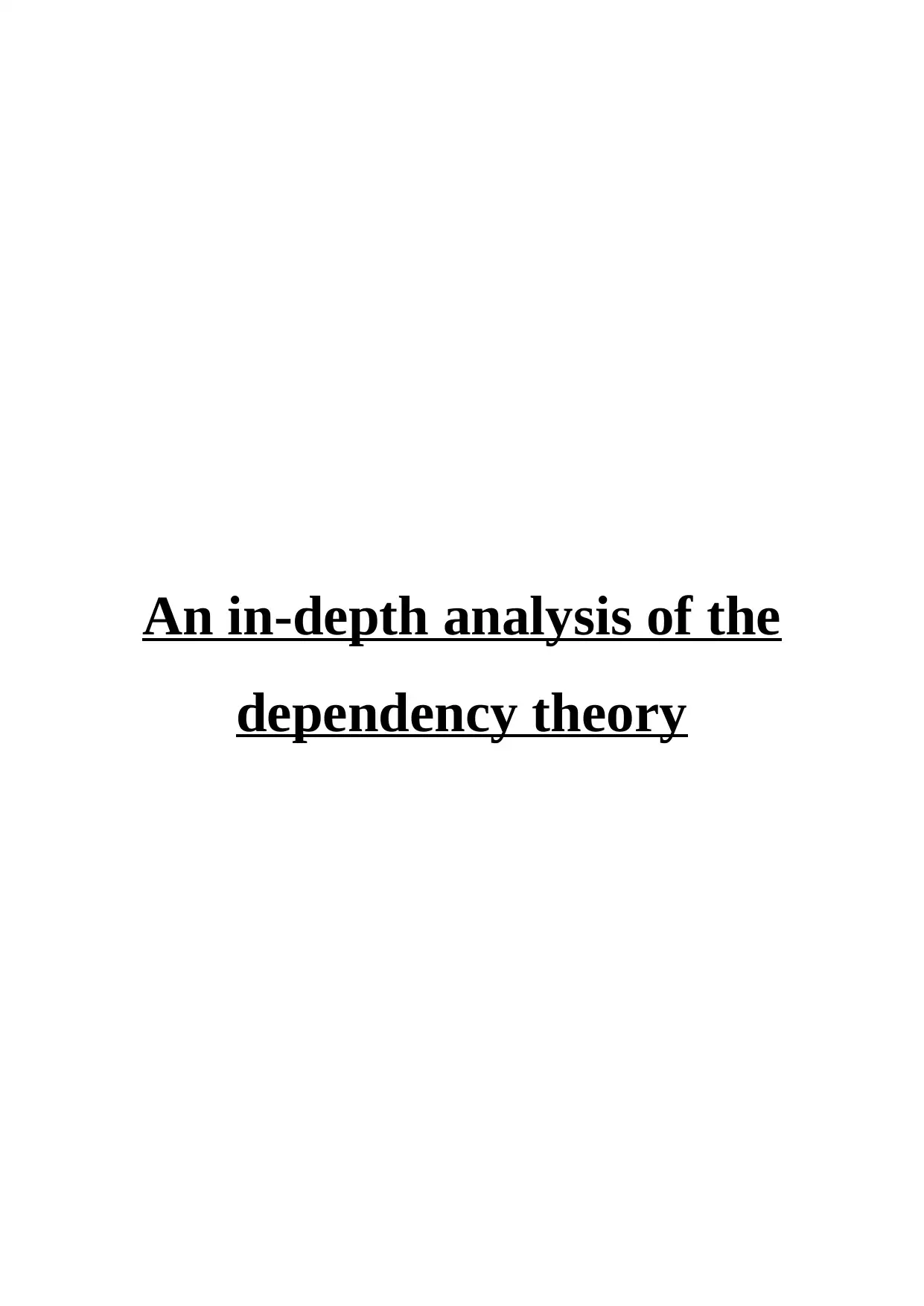
An in-depth analysis of the
dependency theory
dependency theory
Paraphrase This Document
Need a fresh take? Get an instant paraphrase of this document with our AI Paraphraser
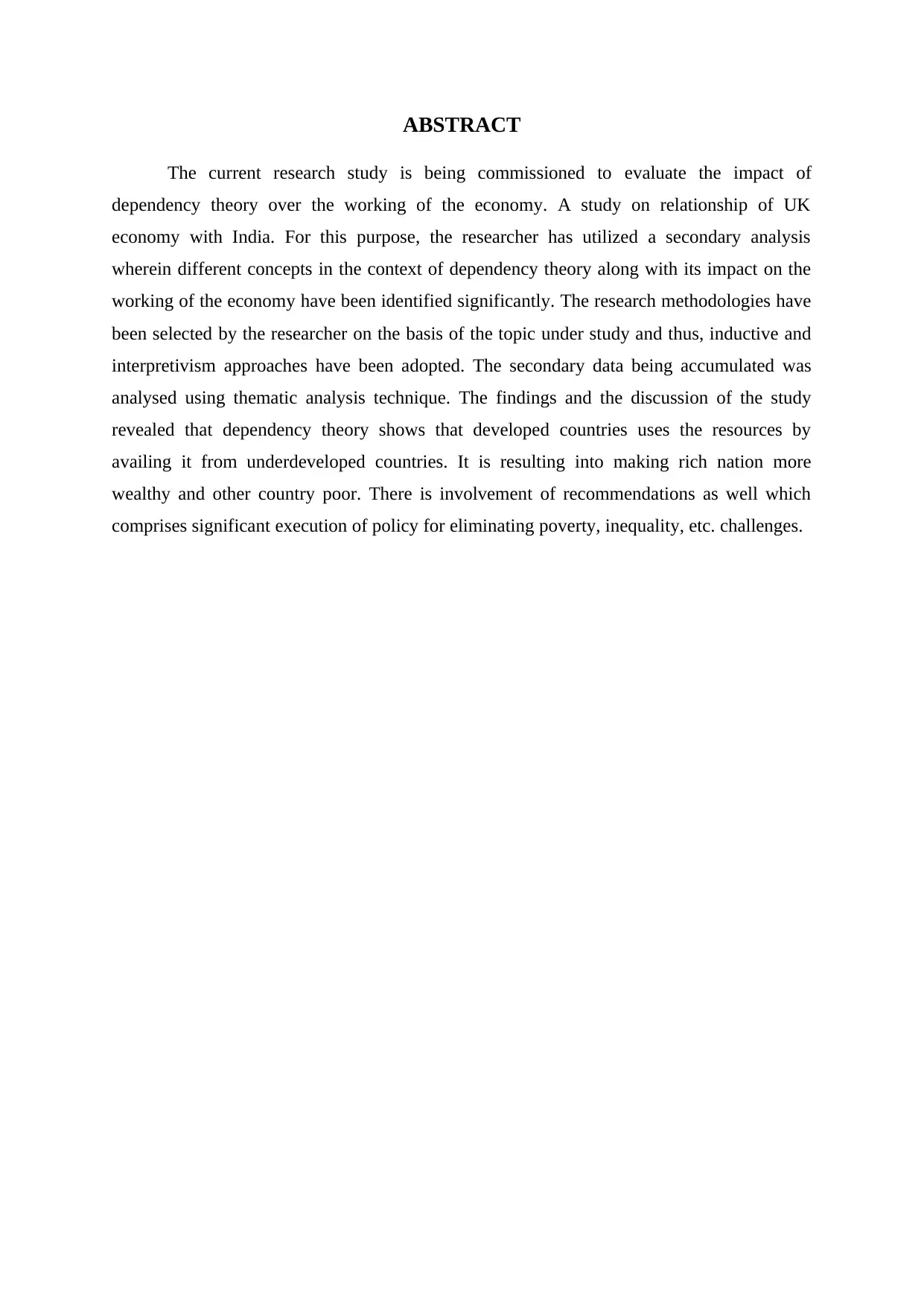
ABSTRACT
The current research study is being commissioned to evaluate the impact of
dependency theory over the working of the economy. A study on relationship of UK
economy with India. For this purpose, the researcher has utilized a secondary analysis
wherein different concepts in the context of dependency theory along with its impact on the
working of the economy have been identified significantly. The research methodologies have
been selected by the researcher on the basis of the topic under study and thus, inductive and
interpretivism approaches have been adopted. The secondary data being accumulated was
analysed using thematic analysis technique. The findings and the discussion of the study
revealed that dependency theory shows that developed countries uses the resources by
availing it from underdeveloped countries. It is resulting into making rich nation more
wealthy and other country poor. There is involvement of recommendations as well which
comprises significant execution of policy for eliminating poverty, inequality, etc. challenges.
The current research study is being commissioned to evaluate the impact of
dependency theory over the working of the economy. A study on relationship of UK
economy with India. For this purpose, the researcher has utilized a secondary analysis
wherein different concepts in the context of dependency theory along with its impact on the
working of the economy have been identified significantly. The research methodologies have
been selected by the researcher on the basis of the topic under study and thus, inductive and
interpretivism approaches have been adopted. The secondary data being accumulated was
analysed using thematic analysis technique. The findings and the discussion of the study
revealed that dependency theory shows that developed countries uses the resources by
availing it from underdeveloped countries. It is resulting into making rich nation more
wealthy and other country poor. There is involvement of recommendations as well which
comprises significant execution of policy for eliminating poverty, inequality, etc. challenges.
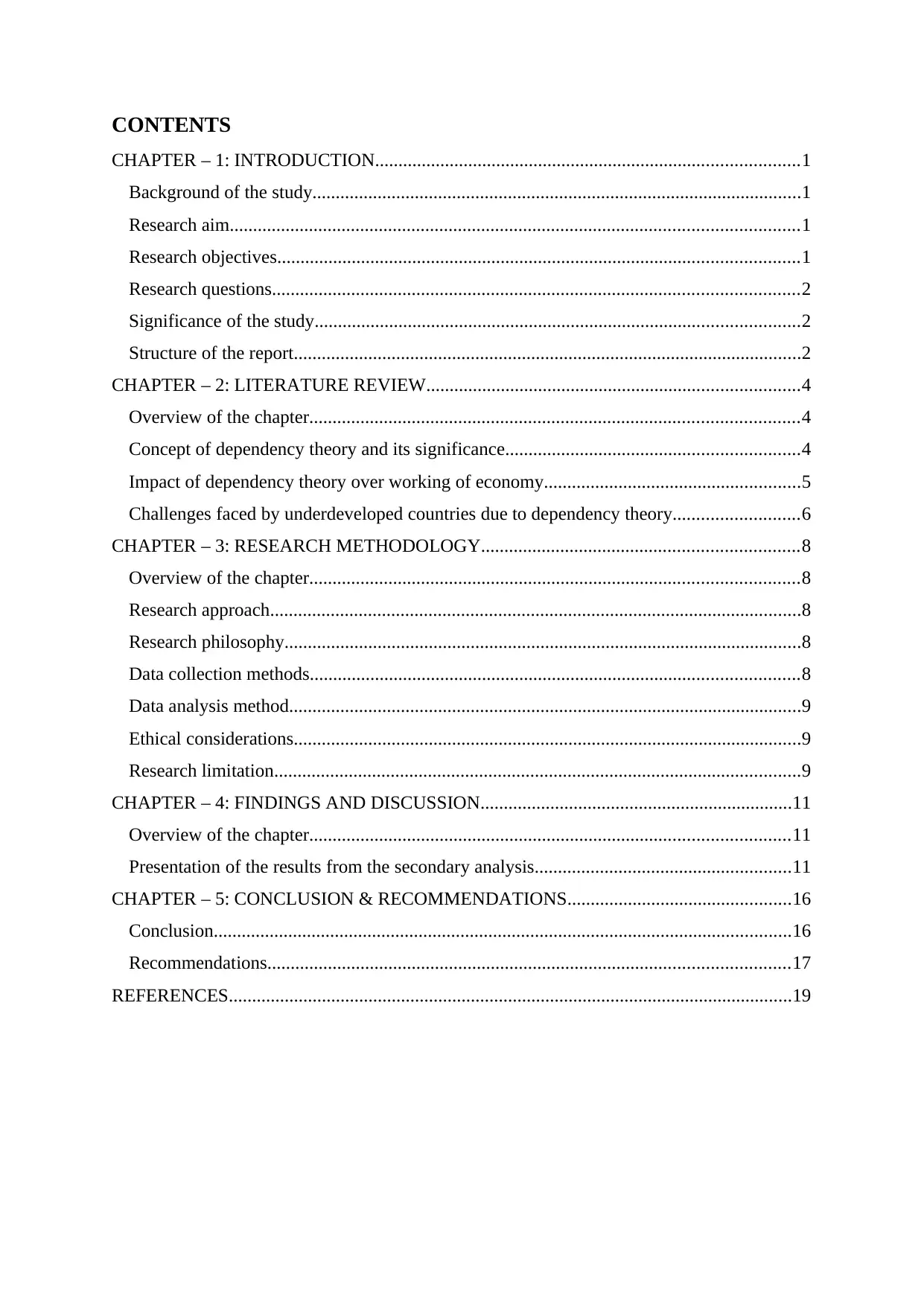
CONTENTS
CHAPTER – 1: INTRODUCTION...........................................................................................1
Background of the study.........................................................................................................1
Research aim..........................................................................................................................1
Research objectives................................................................................................................1
Research questions.................................................................................................................2
Significance of the study........................................................................................................2
Structure of the report.............................................................................................................2
CHAPTER – 2: LITERATURE REVIEW................................................................................4
Overview of the chapter.........................................................................................................4
Concept of dependency theory and its significance...............................................................4
Impact of dependency theory over working of economy.......................................................5
Challenges faced by underdeveloped countries due to dependency theory...........................6
CHAPTER – 3: RESEARCH METHODOLOGY....................................................................8
Overview of the chapter.........................................................................................................8
Research approach..................................................................................................................8
Research philosophy...............................................................................................................8
Data collection methods.........................................................................................................8
Data analysis method..............................................................................................................9
Ethical considerations.............................................................................................................9
Research limitation.................................................................................................................9
CHAPTER – 4: FINDINGS AND DISCUSSION...................................................................11
Overview of the chapter.......................................................................................................11
Presentation of the results from the secondary analysis.......................................................11
CHAPTER – 5: CONCLUSION & RECOMMENDATIONS................................................16
Conclusion............................................................................................................................16
Recommendations................................................................................................................17
REFERENCES.........................................................................................................................19
CHAPTER – 1: INTRODUCTION...........................................................................................1
Background of the study.........................................................................................................1
Research aim..........................................................................................................................1
Research objectives................................................................................................................1
Research questions.................................................................................................................2
Significance of the study........................................................................................................2
Structure of the report.............................................................................................................2
CHAPTER – 2: LITERATURE REVIEW................................................................................4
Overview of the chapter.........................................................................................................4
Concept of dependency theory and its significance...............................................................4
Impact of dependency theory over working of economy.......................................................5
Challenges faced by underdeveloped countries due to dependency theory...........................6
CHAPTER – 3: RESEARCH METHODOLOGY....................................................................8
Overview of the chapter.........................................................................................................8
Research approach..................................................................................................................8
Research philosophy...............................................................................................................8
Data collection methods.........................................................................................................8
Data analysis method..............................................................................................................9
Ethical considerations.............................................................................................................9
Research limitation.................................................................................................................9
CHAPTER – 4: FINDINGS AND DISCUSSION...................................................................11
Overview of the chapter.......................................................................................................11
Presentation of the results from the secondary analysis.......................................................11
CHAPTER – 5: CONCLUSION & RECOMMENDATIONS................................................16
Conclusion............................................................................................................................16
Recommendations................................................................................................................17
REFERENCES.........................................................................................................................19
⊘ This is a preview!⊘
Do you want full access?
Subscribe today to unlock all pages.

Trusted by 1+ million students worldwide
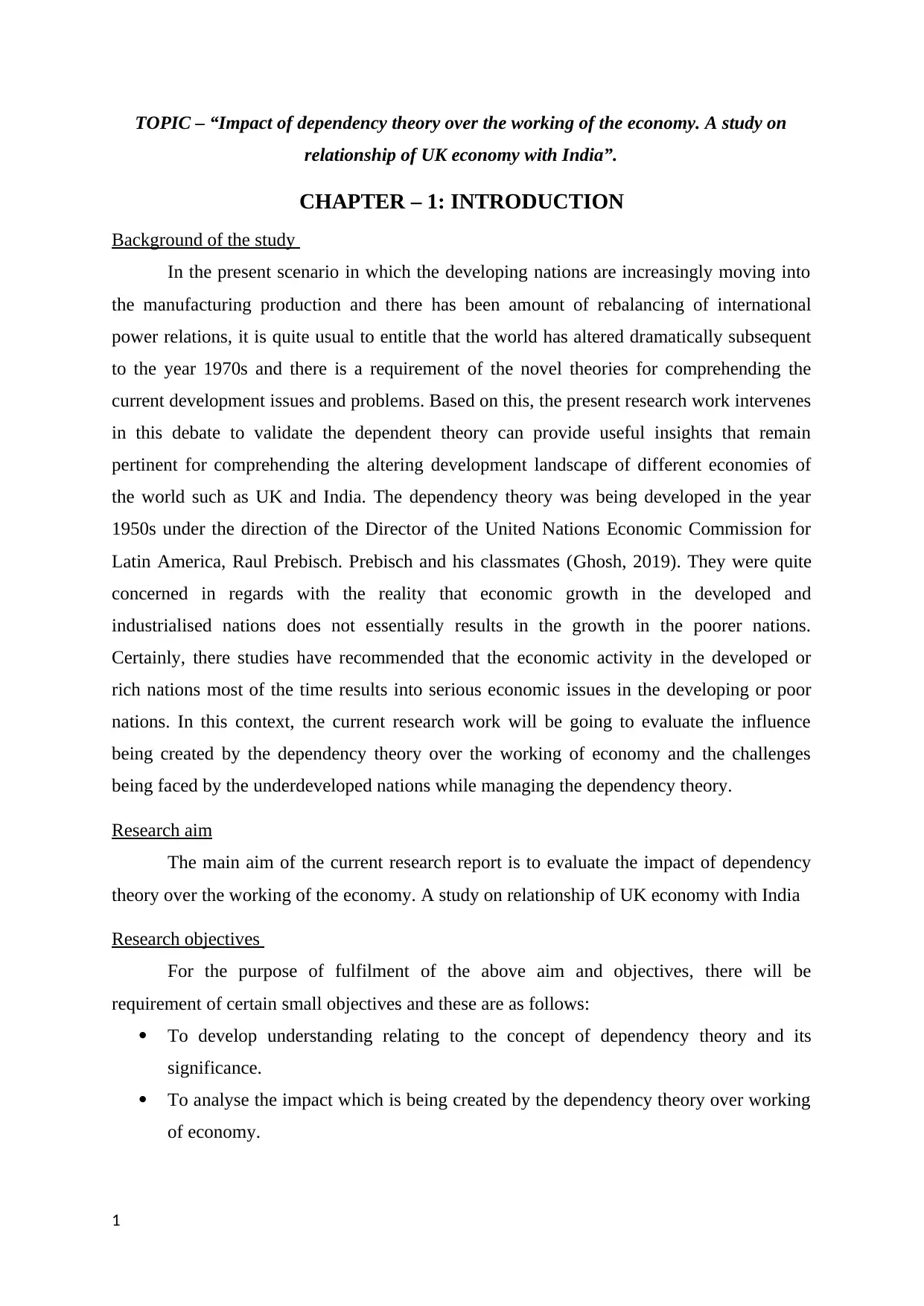
TOPIC – “Impact of dependency theory over the working of the economy. A study on
relationship of UK economy with India”.
CHAPTER – 1: INTRODUCTION
Background of the study
In the present scenario in which the developing nations are increasingly moving into
the manufacturing production and there has been amount of rebalancing of international
power relations, it is quite usual to entitle that the world has altered dramatically subsequent
to the year 1970s and there is a requirement of the novel theories for comprehending the
current development issues and problems. Based on this, the present research work intervenes
in this debate to validate the dependent theory can provide useful insights that remain
pertinent for comprehending the altering development landscape of different economies of
the world such as UK and India. The dependency theory was being developed in the year
1950s under the direction of the Director of the United Nations Economic Commission for
Latin America, Raul Prebisch. Prebisch and his classmates (Ghosh, 2019). They were quite
concerned in regards with the reality that economic growth in the developed and
industrialised nations does not essentially results in the growth in the poorer nations.
Certainly, there studies have recommended that the economic activity in the developed or
rich nations most of the time results into serious economic issues in the developing or poor
nations. In this context, the current research work will be going to evaluate the influence
being created by the dependency theory over the working of economy and the challenges
being faced by the underdeveloped nations while managing the dependency theory.
Research aim
The main aim of the current research report is to evaluate the impact of dependency
theory over the working of the economy. A study on relationship of UK economy with India
Research objectives
For the purpose of fulfilment of the above aim and objectives, there will be
requirement of certain small objectives and these are as follows:
To develop understanding relating to the concept of dependency theory and its
significance.
To analyse the impact which is being created by the dependency theory over working
of economy.
1
relationship of UK economy with India”.
CHAPTER – 1: INTRODUCTION
Background of the study
In the present scenario in which the developing nations are increasingly moving into
the manufacturing production and there has been amount of rebalancing of international
power relations, it is quite usual to entitle that the world has altered dramatically subsequent
to the year 1970s and there is a requirement of the novel theories for comprehending the
current development issues and problems. Based on this, the present research work intervenes
in this debate to validate the dependent theory can provide useful insights that remain
pertinent for comprehending the altering development landscape of different economies of
the world such as UK and India. The dependency theory was being developed in the year
1950s under the direction of the Director of the United Nations Economic Commission for
Latin America, Raul Prebisch. Prebisch and his classmates (Ghosh, 2019). They were quite
concerned in regards with the reality that economic growth in the developed and
industrialised nations does not essentially results in the growth in the poorer nations.
Certainly, there studies have recommended that the economic activity in the developed or
rich nations most of the time results into serious economic issues in the developing or poor
nations. In this context, the current research work will be going to evaluate the influence
being created by the dependency theory over the working of economy and the challenges
being faced by the underdeveloped nations while managing the dependency theory.
Research aim
The main aim of the current research report is to evaluate the impact of dependency
theory over the working of the economy. A study on relationship of UK economy with India
Research objectives
For the purpose of fulfilment of the above aim and objectives, there will be
requirement of certain small objectives and these are as follows:
To develop understanding relating to the concept of dependency theory and its
significance.
To analyse the impact which is being created by the dependency theory over working
of economy.
1
Paraphrase This Document
Need a fresh take? Get an instant paraphrase of this document with our AI Paraphraser
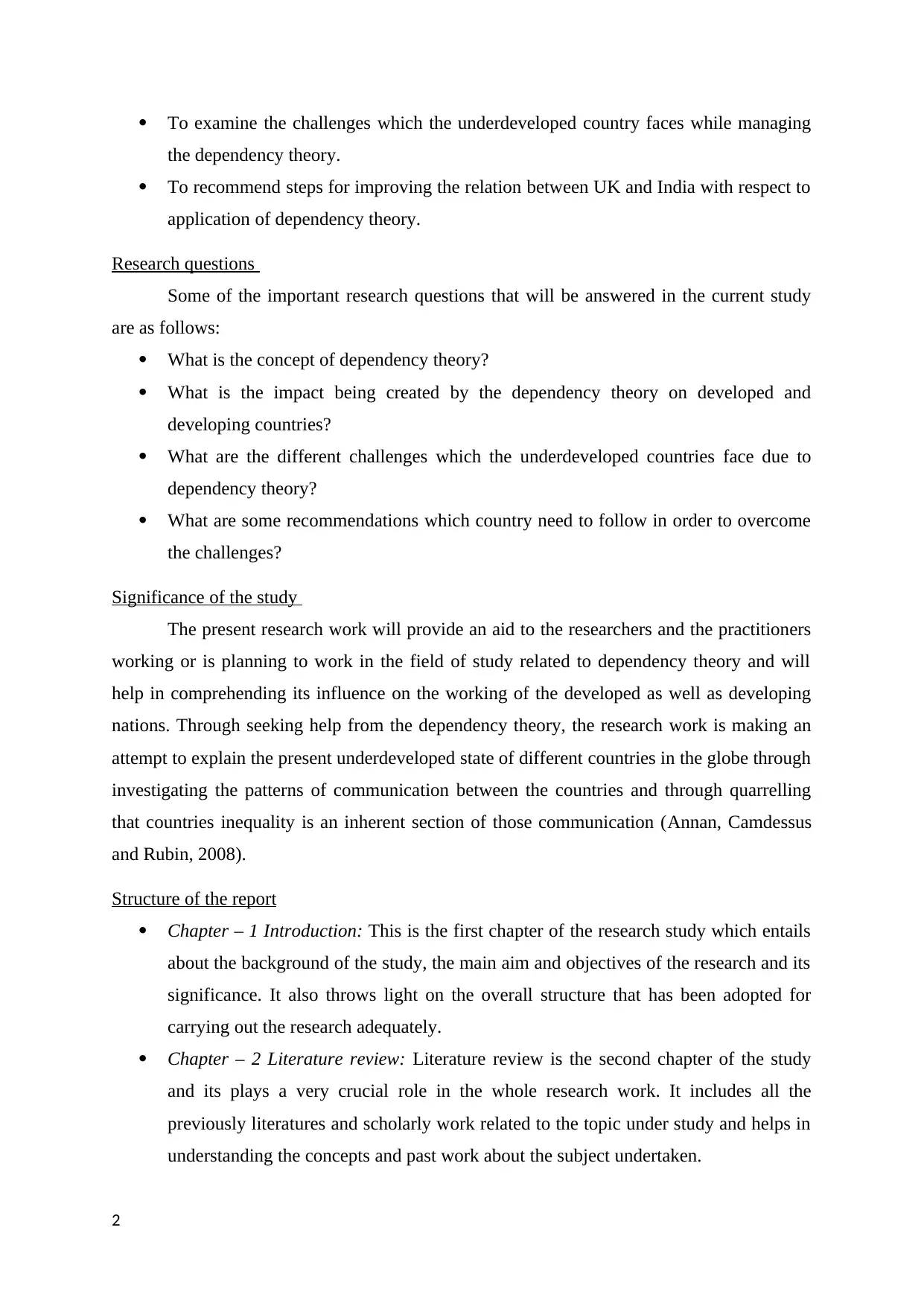
To examine the challenges which the underdeveloped country faces while managing
the dependency theory.
To recommend steps for improving the relation between UK and India with respect to
application of dependency theory.
Research questions
Some of the important research questions that will be answered in the current study
are as follows:
What is the concept of dependency theory?
What is the impact being created by the dependency theory on developed and
developing countries?
What are the different challenges which the underdeveloped countries face due to
dependency theory?
What are some recommendations which country need to follow in order to overcome
the challenges?
Significance of the study
The present research work will provide an aid to the researchers and the practitioners
working or is planning to work in the field of study related to dependency theory and will
help in comprehending its influence on the working of the developed as well as developing
nations. Through seeking help from the dependency theory, the research work is making an
attempt to explain the present underdeveloped state of different countries in the globe through
investigating the patterns of communication between the countries and through quarrelling
that countries inequality is an inherent section of those communication (Annan, Camdessus
and Rubin, 2008).
Structure of the report
Chapter – 1 Introduction: This is the first chapter of the research study which entails
about the background of the study, the main aim and objectives of the research and its
significance. It also throws light on the overall structure that has been adopted for
carrying out the research adequately.
Chapter – 2 Literature review: Literature review is the second chapter of the study
and its plays a very crucial role in the whole research work. It includes all the
previously literatures and scholarly work related to the topic under study and helps in
understanding the concepts and past work about the subject undertaken.
2
the dependency theory.
To recommend steps for improving the relation between UK and India with respect to
application of dependency theory.
Research questions
Some of the important research questions that will be answered in the current study
are as follows:
What is the concept of dependency theory?
What is the impact being created by the dependency theory on developed and
developing countries?
What are the different challenges which the underdeveloped countries face due to
dependency theory?
What are some recommendations which country need to follow in order to overcome
the challenges?
Significance of the study
The present research work will provide an aid to the researchers and the practitioners
working or is planning to work in the field of study related to dependency theory and will
help in comprehending its influence on the working of the developed as well as developing
nations. Through seeking help from the dependency theory, the research work is making an
attempt to explain the present underdeveloped state of different countries in the globe through
investigating the patterns of communication between the countries and through quarrelling
that countries inequality is an inherent section of those communication (Annan, Camdessus
and Rubin, 2008).
Structure of the report
Chapter – 1 Introduction: This is the first chapter of the research study which entails
about the background of the study, the main aim and objectives of the research and its
significance. It also throws light on the overall structure that has been adopted for
carrying out the research adequately.
Chapter – 2 Literature review: Literature review is the second chapter of the study
and its plays a very crucial role in the whole research work. It includes all the
previously literatures and scholarly work related to the topic under study and helps in
understanding the concepts and past work about the subject undertaken.
2
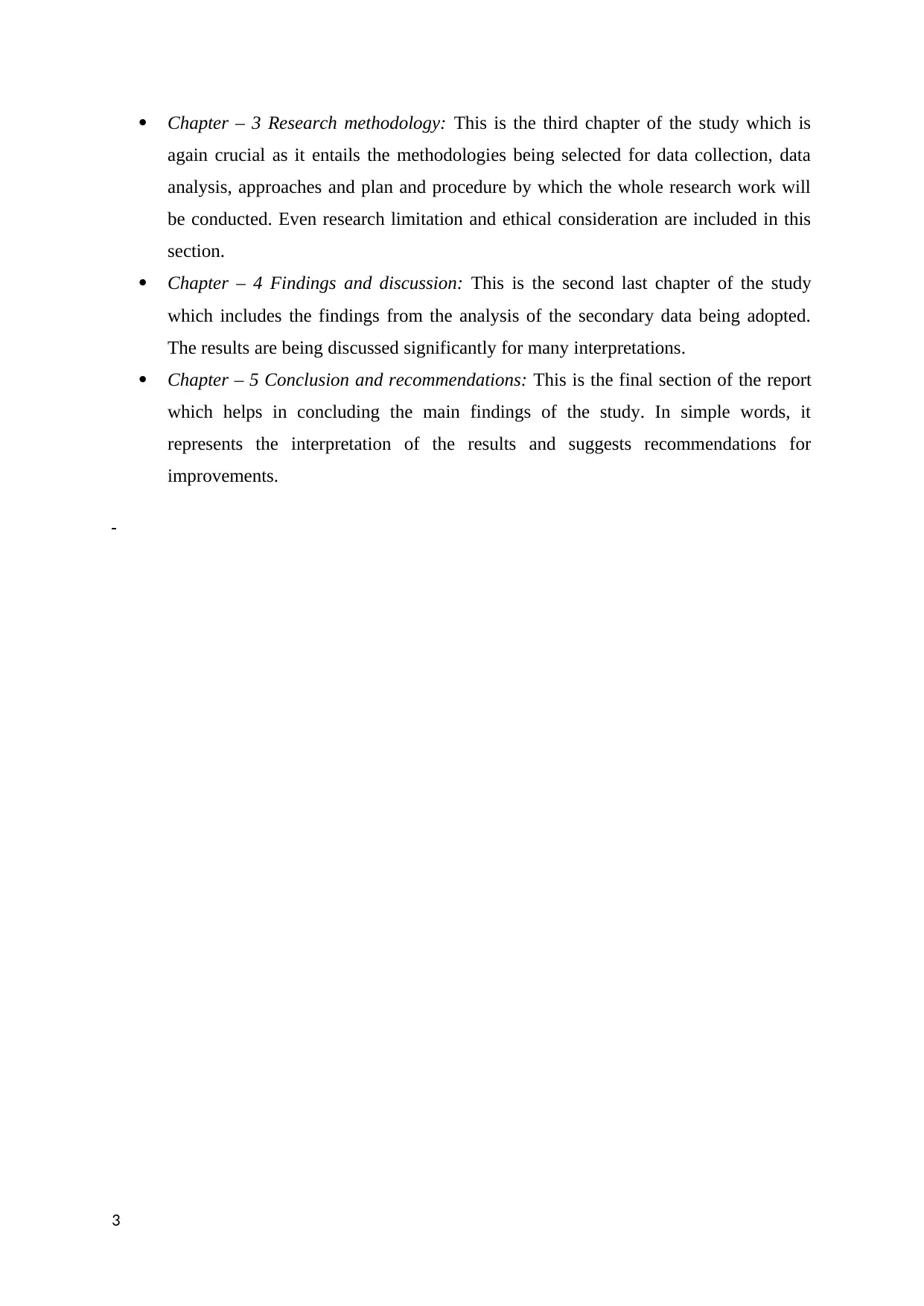
Chapter – 3 Research methodology: This is the third chapter of the study which is
again crucial as it entails the methodologies being selected for data collection, data
analysis, approaches and plan and procedure by which the whole research work will
be conducted. Even research limitation and ethical consideration are included in this
section.
Chapter – 4 Findings and discussion: This is the second last chapter of the study
which includes the findings from the analysis of the secondary data being adopted.
The results are being discussed significantly for many interpretations.
Chapter – 5 Conclusion and recommendations: This is the final section of the report
which helps in concluding the main findings of the study. In simple words, it
represents the interpretation of the results and suggests recommendations for
improvements.
3
again crucial as it entails the methodologies being selected for data collection, data
analysis, approaches and plan and procedure by which the whole research work will
be conducted. Even research limitation and ethical consideration are included in this
section.
Chapter – 4 Findings and discussion: This is the second last chapter of the study
which includes the findings from the analysis of the secondary data being adopted.
The results are being discussed significantly for many interpretations.
Chapter – 5 Conclusion and recommendations: This is the final section of the report
which helps in concluding the main findings of the study. In simple words, it
represents the interpretation of the results and suggests recommendations for
improvements.
3
⊘ This is a preview!⊘
Do you want full access?
Subscribe today to unlock all pages.

Trusted by 1+ million students worldwide
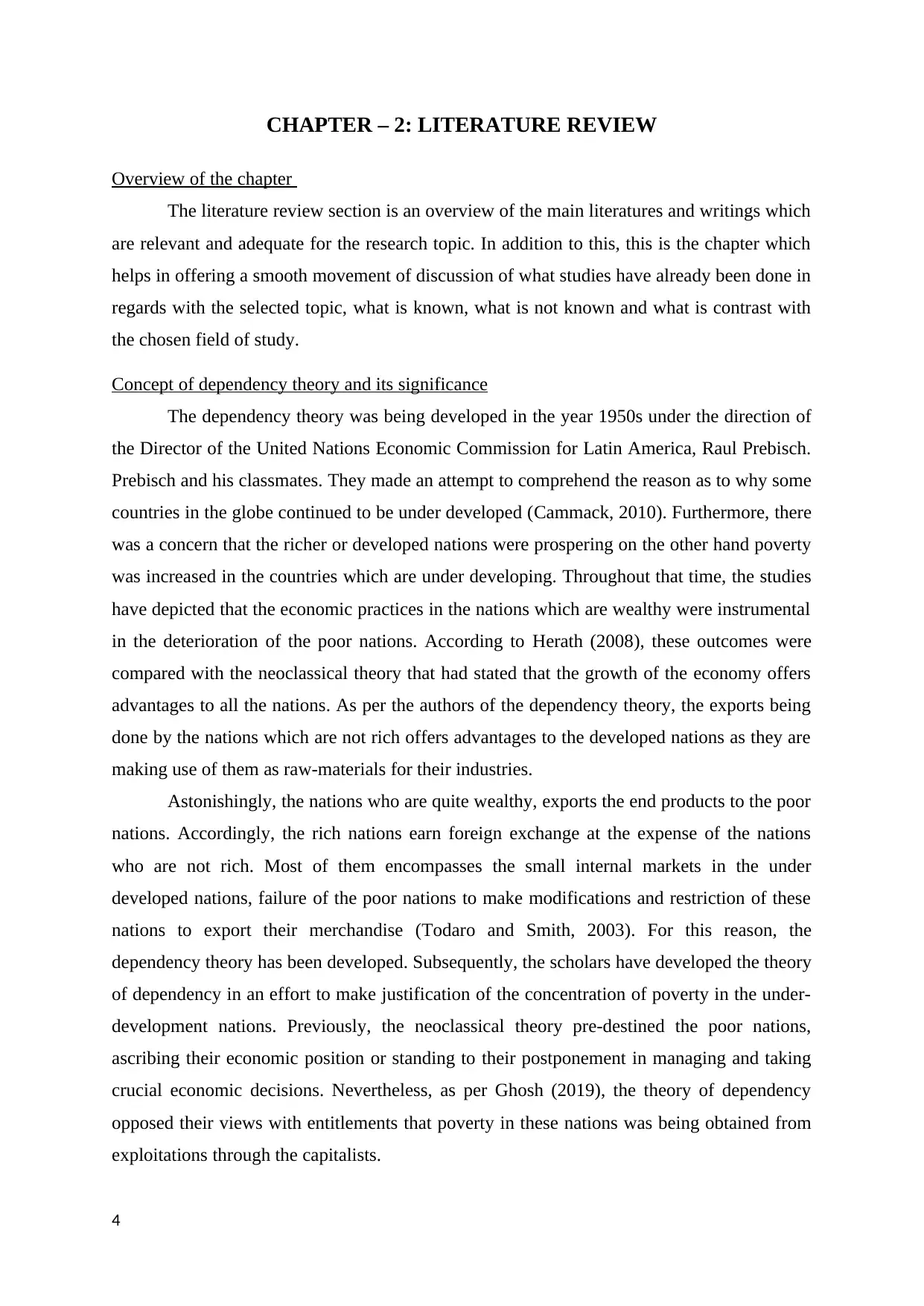
CHAPTER – 2: LITERATURE REVIEW
Overview of the chapter
The literature review section is an overview of the main literatures and writings which
are relevant and adequate for the research topic. In addition to this, this is the chapter which
helps in offering a smooth movement of discussion of what studies have already been done in
regards with the selected topic, what is known, what is not known and what is contrast with
the chosen field of study.
Concept of dependency theory and its significance
The dependency theory was being developed in the year 1950s under the direction of
the Director of the United Nations Economic Commission for Latin America, Raul Prebisch.
Prebisch and his classmates. They made an attempt to comprehend the reason as to why some
countries in the globe continued to be under developed (Cammack, 2010). Furthermore, there
was a concern that the richer or developed nations were prospering on the other hand poverty
was increased in the countries which are under developing. Throughout that time, the studies
have depicted that the economic practices in the nations which are wealthy were instrumental
in the deterioration of the poor nations. According to Herath (2008), these outcomes were
compared with the neoclassical theory that had stated that the growth of the economy offers
advantages to all the nations. As per the authors of the dependency theory, the exports being
done by the nations which are not rich offers advantages to the developed nations as they are
making use of them as raw-materials for their industries.
Astonishingly, the nations who are quite wealthy, exports the end products to the poor
nations. Accordingly, the rich nations earn foreign exchange at the expense of the nations
who are not rich. Most of them encompasses the small internal markets in the under
developed nations, failure of the poor nations to make modifications and restriction of these
nations to export their merchandise (Todaro and Smith, 2003). For this reason, the
dependency theory has been developed. Subsequently, the scholars have developed the theory
of dependency in an effort to make justification of the concentration of poverty in the under-
development nations. Previously, the neoclassical theory pre-destined the poor nations,
ascribing their economic position or standing to their postponement in managing and taking
crucial economic decisions. Nevertheless, as per Ghosh (2019), the theory of dependency
opposed their views with entitlements that poverty in these nations was being obtained from
exploitations through the capitalists.
4
Overview of the chapter
The literature review section is an overview of the main literatures and writings which
are relevant and adequate for the research topic. In addition to this, this is the chapter which
helps in offering a smooth movement of discussion of what studies have already been done in
regards with the selected topic, what is known, what is not known and what is contrast with
the chosen field of study.
Concept of dependency theory and its significance
The dependency theory was being developed in the year 1950s under the direction of
the Director of the United Nations Economic Commission for Latin America, Raul Prebisch.
Prebisch and his classmates. They made an attempt to comprehend the reason as to why some
countries in the globe continued to be under developed (Cammack, 2010). Furthermore, there
was a concern that the richer or developed nations were prospering on the other hand poverty
was increased in the countries which are under developing. Throughout that time, the studies
have depicted that the economic practices in the nations which are wealthy were instrumental
in the deterioration of the poor nations. According to Herath (2008), these outcomes were
compared with the neoclassical theory that had stated that the growth of the economy offers
advantages to all the nations. As per the authors of the dependency theory, the exports being
done by the nations which are not rich offers advantages to the developed nations as they are
making use of them as raw-materials for their industries.
Astonishingly, the nations who are quite wealthy, exports the end products to the poor
nations. Accordingly, the rich nations earn foreign exchange at the expense of the nations
who are not rich. Most of them encompasses the small internal markets in the under
developed nations, failure of the poor nations to make modifications and restriction of these
nations to export their merchandise (Todaro and Smith, 2003). For this reason, the
dependency theory has been developed. Subsequently, the scholars have developed the theory
of dependency in an effort to make justification of the concentration of poverty in the under-
development nations. Previously, the neoclassical theory pre-destined the poor nations,
ascribing their economic position or standing to their postponement in managing and taking
crucial economic decisions. Nevertheless, as per Ghosh (2019), the theory of dependency
opposed their views with entitlements that poverty in these nations was being obtained from
exploitations through the capitalists.
4
Paraphrase This Document
Need a fresh take? Get an instant paraphrase of this document with our AI Paraphraser
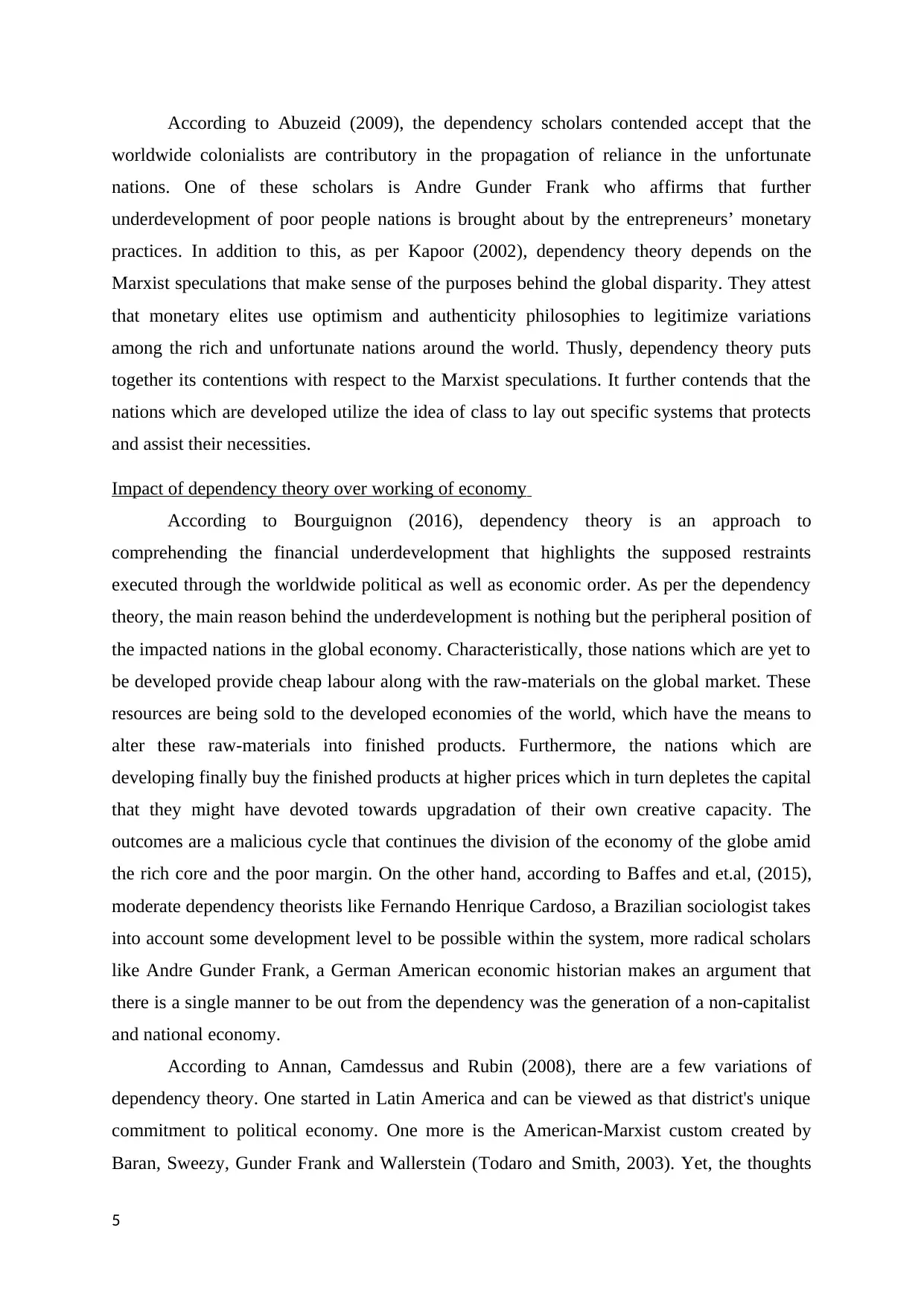
According to Abuzeid (2009), the dependency scholars contended accept that the
worldwide colonialists are contributory in the propagation of reliance in the unfortunate
nations. One of these scholars is Andre Gunder Frank who affirms that further
underdevelopment of poor people nations is brought about by the entrepreneurs’ monetary
practices. In addition to this, as per Kapoor (2002), dependency theory depends on the
Marxist speculations that make sense of the purposes behind the global disparity. They attest
that monetary elites use optimism and authenticity philosophies to legitimize variations
among the rich and unfortunate nations around the world. Thusly, dependency theory puts
together its contentions with respect to the Marxist speculations. It further contends that the
nations which are developed utilize the idea of class to lay out specific systems that protects
and assist their necessities.
Impact of dependency theory over working of economy
According to Bourguignon (2016), dependency theory is an approach to
comprehending the financial underdevelopment that highlights the supposed restraints
executed through the worldwide political as well as economic order. As per the dependency
theory, the main reason behind the underdevelopment is nothing but the peripheral position of
the impacted nations in the global economy. Characteristically, those nations which are yet to
be developed provide cheap labour along with the raw-materials on the global market. These
resources are being sold to the developed economies of the world, which have the means to
alter these raw-materials into finished products. Furthermore, the nations which are
developing finally buy the finished products at higher prices which in turn depletes the capital
that they might have devoted towards upgradation of their own creative capacity. The
outcomes are a malicious cycle that continues the division of the economy of the globe amid
the rich core and the poor margin. On the other hand, according to Baffes and et.al, (2015),
moderate dependency theorists like Fernando Henrique Cardoso, a Brazilian sociologist takes
into account some development level to be possible within the system, more radical scholars
like Andre Gunder Frank, a German American economic historian makes an argument that
there is a single manner to be out from the dependency was the generation of a non-capitalist
and national economy.
According to Annan, Camdessus and Rubin (2008), there are a few variations of
dependency theory. One started in Latin America and can be viewed as that district's unique
commitment to political economy. One more is the American-Marxist custom created by
Baran, Sweezy, Gunder Frank and Wallerstein (Todaro and Smith, 2003). Yet, the thoughts
5
worldwide colonialists are contributory in the propagation of reliance in the unfortunate
nations. One of these scholars is Andre Gunder Frank who affirms that further
underdevelopment of poor people nations is brought about by the entrepreneurs’ monetary
practices. In addition to this, as per Kapoor (2002), dependency theory depends on the
Marxist speculations that make sense of the purposes behind the global disparity. They attest
that monetary elites use optimism and authenticity philosophies to legitimize variations
among the rich and unfortunate nations around the world. Thusly, dependency theory puts
together its contentions with respect to the Marxist speculations. It further contends that the
nations which are developed utilize the idea of class to lay out specific systems that protects
and assist their necessities.
Impact of dependency theory over working of economy
According to Bourguignon (2016), dependency theory is an approach to
comprehending the financial underdevelopment that highlights the supposed restraints
executed through the worldwide political as well as economic order. As per the dependency
theory, the main reason behind the underdevelopment is nothing but the peripheral position of
the impacted nations in the global economy. Characteristically, those nations which are yet to
be developed provide cheap labour along with the raw-materials on the global market. These
resources are being sold to the developed economies of the world, which have the means to
alter these raw-materials into finished products. Furthermore, the nations which are
developing finally buy the finished products at higher prices which in turn depletes the capital
that they might have devoted towards upgradation of their own creative capacity. The
outcomes are a malicious cycle that continues the division of the economy of the globe amid
the rich core and the poor margin. On the other hand, according to Baffes and et.al, (2015),
moderate dependency theorists like Fernando Henrique Cardoso, a Brazilian sociologist takes
into account some development level to be possible within the system, more radical scholars
like Andre Gunder Frank, a German American economic historian makes an argument that
there is a single manner to be out from the dependency was the generation of a non-capitalist
and national economy.
According to Annan, Camdessus and Rubin (2008), there are a few variations of
dependency theory. One started in Latin America and can be viewed as that district's unique
commitment to political economy. One more is the American-Marxist custom created by
Baran, Sweezy, Gunder Frank and Wallerstein (Todaro and Smith, 2003). Yet, the thoughts
5
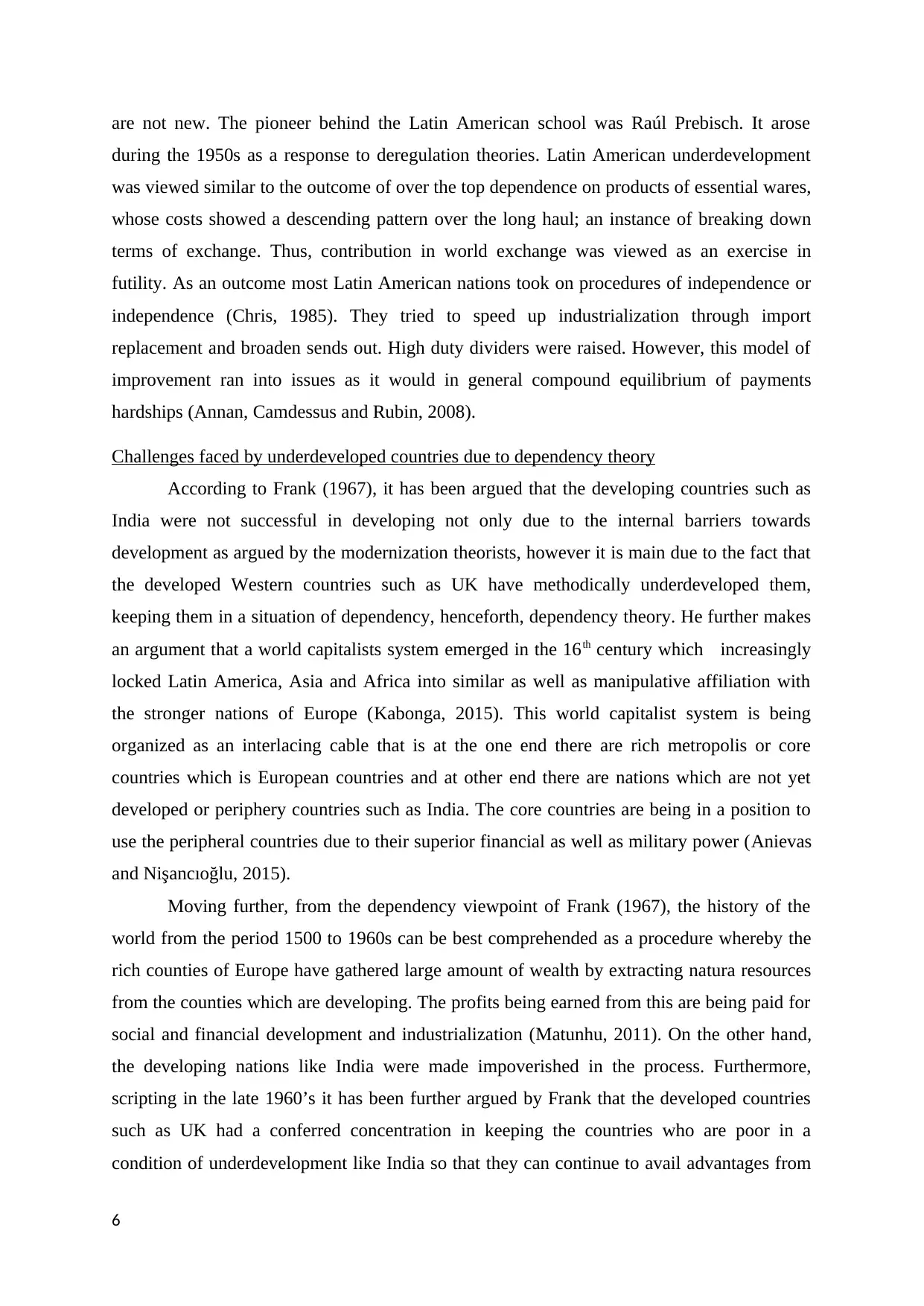
are not new. The pioneer behind the Latin American school was Raúl Prebisch. It arose
during the 1950s as a response to deregulation theories. Latin American underdevelopment
was viewed similar to the outcome of over the top dependence on products of essential wares,
whose costs showed a descending pattern over the long haul; an instance of breaking down
terms of exchange. Thus, contribution in world exchange was viewed as an exercise in
futility. As an outcome most Latin American nations took on procedures of independence or
independence (Chris, 1985). They tried to speed up industrialization through import
replacement and broaden sends out. High duty dividers were raised. However, this model of
improvement ran into issues as it would in general compound equilibrium of payments
hardships (Annan, Camdessus and Rubin, 2008).
Challenges faced by underdeveloped countries due to dependency theory
According to Frank (1967), it has been argued that the developing countries such as
India were not successful in developing not only due to the internal barriers towards
development as argued by the modernization theorists, however it is main due to the fact that
the developed Western countries such as UK have methodically underdeveloped them,
keeping them in a situation of dependency, henceforth, dependency theory. He further makes
an argument that a world capitalists system emerged in the 16th century which increasingly
locked Latin America, Asia and Africa into similar as well as manipulative affiliation with
the stronger nations of Europe (Kabonga, 2015). This world capitalist system is being
organized as an interlacing cable that is at the one end there are rich metropolis or core
countries which is European countries and at other end there are nations which are not yet
developed or periphery countries such as India. The core countries are being in a position to
use the peripheral countries due to their superior financial as well as military power (Anievas
and Nişancıoğlu, 2015).
Moving further, from the dependency viewpoint of Frank (1967), the history of the
world from the period 1500 to 1960s can be best comprehended as a procedure whereby the
rich counties of Europe have gathered large amount of wealth by extracting natura resources
from the counties which are developing. The profits being earned from this are being paid for
social and financial development and industrialization (Matunhu, 2011). On the other hand,
the developing nations like India were made impoverished in the process. Furthermore,
scripting in the late 1960’s it has been further argued by Frank that the developed countries
such as UK had a conferred concentration in keeping the countries who are poor in a
condition of underdevelopment like India so that they can continue to avail advantages from
6
during the 1950s as a response to deregulation theories. Latin American underdevelopment
was viewed similar to the outcome of over the top dependence on products of essential wares,
whose costs showed a descending pattern over the long haul; an instance of breaking down
terms of exchange. Thus, contribution in world exchange was viewed as an exercise in
futility. As an outcome most Latin American nations took on procedures of independence or
independence (Chris, 1985). They tried to speed up industrialization through import
replacement and broaden sends out. High duty dividers were raised. However, this model of
improvement ran into issues as it would in general compound equilibrium of payments
hardships (Annan, Camdessus and Rubin, 2008).
Challenges faced by underdeveloped countries due to dependency theory
According to Frank (1967), it has been argued that the developing countries such as
India were not successful in developing not only due to the internal barriers towards
development as argued by the modernization theorists, however it is main due to the fact that
the developed Western countries such as UK have methodically underdeveloped them,
keeping them in a situation of dependency, henceforth, dependency theory. He further makes
an argument that a world capitalists system emerged in the 16th century which increasingly
locked Latin America, Asia and Africa into similar as well as manipulative affiliation with
the stronger nations of Europe (Kabonga, 2015). This world capitalist system is being
organized as an interlacing cable that is at the one end there are rich metropolis or core
countries which is European countries and at other end there are nations which are not yet
developed or periphery countries such as India. The core countries are being in a position to
use the peripheral countries due to their superior financial as well as military power (Anievas
and Nişancıoğlu, 2015).
Moving further, from the dependency viewpoint of Frank (1967), the history of the
world from the period 1500 to 1960s can be best comprehended as a procedure whereby the
rich counties of Europe have gathered large amount of wealth by extracting natura resources
from the counties which are developing. The profits being earned from this are being paid for
social and financial development and industrialization (Matunhu, 2011). On the other hand,
the developing nations like India were made impoverished in the process. Furthermore,
scripting in the late 1960’s it has been further argued by Frank that the developed countries
such as UK had a conferred concentration in keeping the countries who are poor in a
condition of underdevelopment like India so that they can continue to avail advantages from
6
⊘ This is a preview!⊘
Do you want full access?
Subscribe today to unlock all pages.

Trusted by 1+ million students worldwide
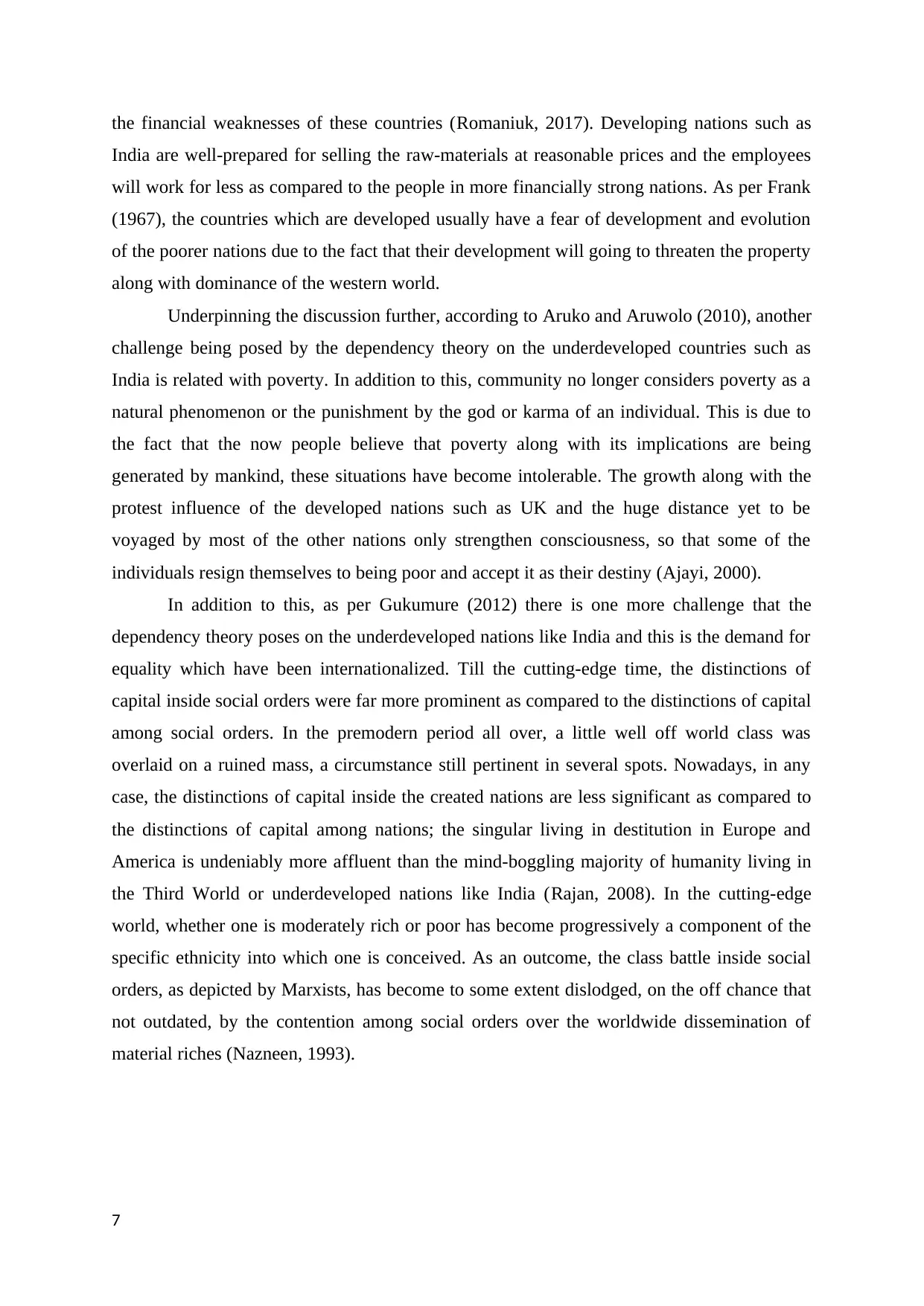
the financial weaknesses of these countries (Romaniuk, 2017). Developing nations such as
India are well-prepared for selling the raw-materials at reasonable prices and the employees
will work for less as compared to the people in more financially strong nations. As per Frank
(1967), the countries which are developed usually have a fear of development and evolution
of the poorer nations due to the fact that their development will going to threaten the property
along with dominance of the western world.
Underpinning the discussion further, according to Aruko and Aruwolo (2010), another
challenge being posed by the dependency theory on the underdeveloped countries such as
India is related with poverty. In addition to this, community no longer considers poverty as a
natural phenomenon or the punishment by the god or karma of an individual. This is due to
the fact that the now people believe that poverty along with its implications are being
generated by mankind, these situations have become intolerable. The growth along with the
protest influence of the developed nations such as UK and the huge distance yet to be
voyaged by most of the other nations only strengthen consciousness, so that some of the
individuals resign themselves to being poor and accept it as their destiny (Ajayi, 2000).
In addition to this, as per Gukumure (2012) there is one more challenge that the
dependency theory poses on the underdeveloped nations like India and this is the demand for
equality which have been internationalized. Till the cutting-edge time, the distinctions of
capital inside social orders were far more prominent as compared to the distinctions of capital
among social orders. In the premodern period all over, a little well off world class was
overlaid on a ruined mass, a circumstance still pertinent in several spots. Nowadays, in any
case, the distinctions of capital inside the created nations are less significant as compared to
the distinctions of capital among nations; the singular living in destitution in Europe and
America is undeniably more affluent than the mind-boggling majority of humanity living in
the Third World or underdeveloped nations like India (Rajan, 2008). In the cutting-edge
world, whether one is moderately rich or poor has become progressively a component of the
specific ethnicity into which one is conceived. As an outcome, the class battle inside social
orders, as depicted by Marxists, has become to some extent dislodged, on the off chance that
not outdated, by the contention among social orders over the worldwide dissemination of
material riches (Nazneen, 1993).
7
India are well-prepared for selling the raw-materials at reasonable prices and the employees
will work for less as compared to the people in more financially strong nations. As per Frank
(1967), the countries which are developed usually have a fear of development and evolution
of the poorer nations due to the fact that their development will going to threaten the property
along with dominance of the western world.
Underpinning the discussion further, according to Aruko and Aruwolo (2010), another
challenge being posed by the dependency theory on the underdeveloped countries such as
India is related with poverty. In addition to this, community no longer considers poverty as a
natural phenomenon or the punishment by the god or karma of an individual. This is due to
the fact that the now people believe that poverty along with its implications are being
generated by mankind, these situations have become intolerable. The growth along with the
protest influence of the developed nations such as UK and the huge distance yet to be
voyaged by most of the other nations only strengthen consciousness, so that some of the
individuals resign themselves to being poor and accept it as their destiny (Ajayi, 2000).
In addition to this, as per Gukumure (2012) there is one more challenge that the
dependency theory poses on the underdeveloped nations like India and this is the demand for
equality which have been internationalized. Till the cutting-edge time, the distinctions of
capital inside social orders were far more prominent as compared to the distinctions of capital
among social orders. In the premodern period all over, a little well off world class was
overlaid on a ruined mass, a circumstance still pertinent in several spots. Nowadays, in any
case, the distinctions of capital inside the created nations are less significant as compared to
the distinctions of capital among nations; the singular living in destitution in Europe and
America is undeniably more affluent than the mind-boggling majority of humanity living in
the Third World or underdeveloped nations like India (Rajan, 2008). In the cutting-edge
world, whether one is moderately rich or poor has become progressively a component of the
specific ethnicity into which one is conceived. As an outcome, the class battle inside social
orders, as depicted by Marxists, has become to some extent dislodged, on the off chance that
not outdated, by the contention among social orders over the worldwide dissemination of
material riches (Nazneen, 1993).
7
Paraphrase This Document
Need a fresh take? Get an instant paraphrase of this document with our AI Paraphraser
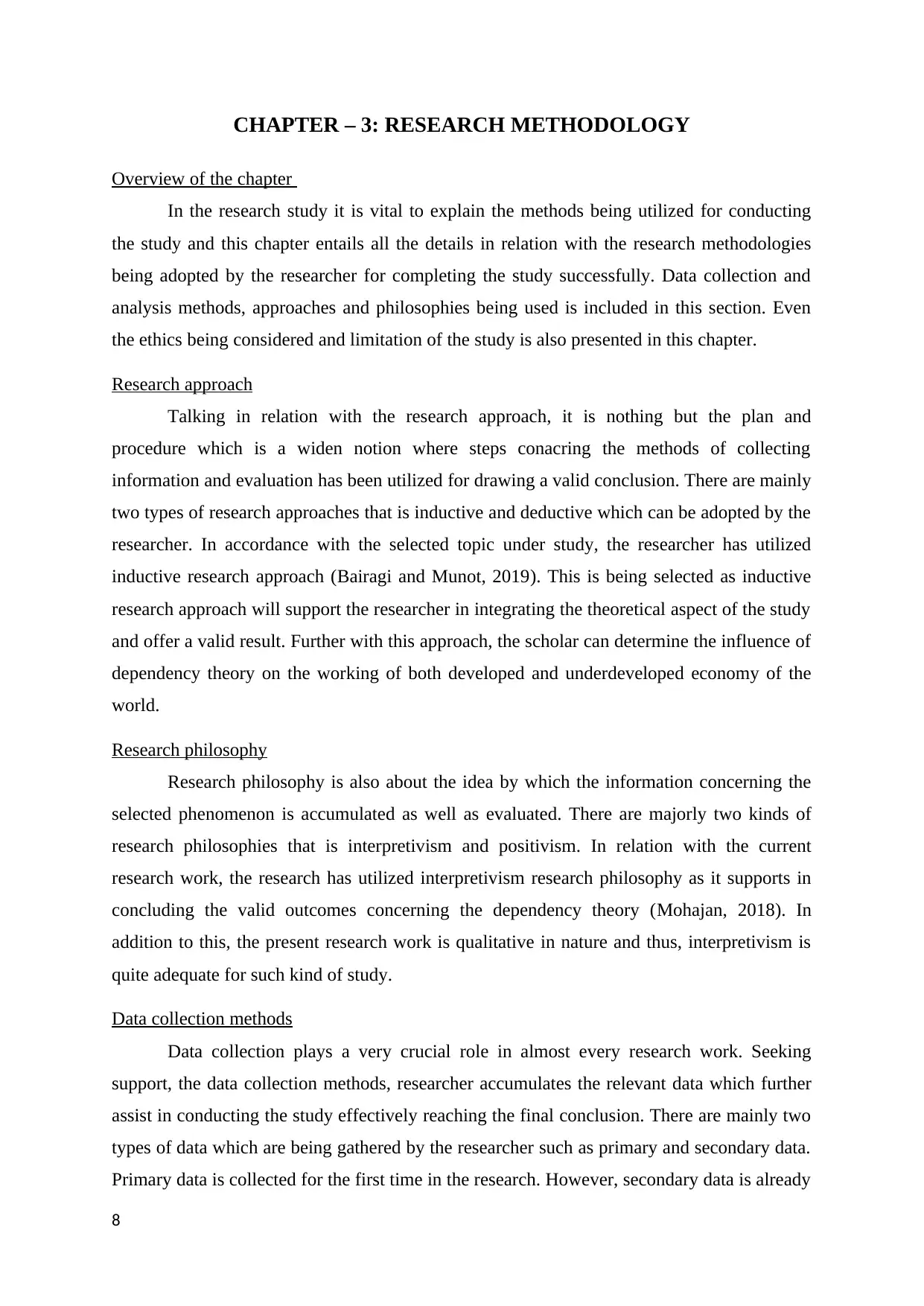
CHAPTER – 3: RESEARCH METHODOLOGY
Overview of the chapter
In the research study it is vital to explain the methods being utilized for conducting
the study and this chapter entails all the details in relation with the research methodologies
being adopted by the researcher for completing the study successfully. Data collection and
analysis methods, approaches and philosophies being used is included in this section. Even
the ethics being considered and limitation of the study is also presented in this chapter.
Research approach
Talking in relation with the research approach, it is nothing but the plan and
procedure which is a widen notion where steps conacring the methods of collecting
information and evaluation has been utilized for drawing a valid conclusion. There are mainly
two types of research approaches that is inductive and deductive which can be adopted by the
researcher. In accordance with the selected topic under study, the researcher has utilized
inductive research approach (Bairagi and Munot, 2019). This is being selected as inductive
research approach will support the researcher in integrating the theoretical aspect of the study
and offer a valid result. Further with this approach, the scholar can determine the influence of
dependency theory on the working of both developed and underdeveloped economy of the
world.
Research philosophy
Research philosophy is also about the idea by which the information concerning the
selected phenomenon is accumulated as well as evaluated. There are majorly two kinds of
research philosophies that is interpretivism and positivism. In relation with the current
research work, the research has utilized interpretivism research philosophy as it supports in
concluding the valid outcomes concerning the dependency theory (Mohajan, 2018). In
addition to this, the present research work is qualitative in nature and thus, interpretivism is
quite adequate for such kind of study.
Data collection methods
Data collection plays a very crucial role in almost every research work. Seeking
support, the data collection methods, researcher accumulates the relevant data which further
assist in conducting the study effectively reaching the final conclusion. There are mainly two
types of data which are being gathered by the researcher such as primary and secondary data.
Primary data is collected for the first time in the research. However, secondary data is already
8
Overview of the chapter
In the research study it is vital to explain the methods being utilized for conducting
the study and this chapter entails all the details in relation with the research methodologies
being adopted by the researcher for completing the study successfully. Data collection and
analysis methods, approaches and philosophies being used is included in this section. Even
the ethics being considered and limitation of the study is also presented in this chapter.
Research approach
Talking in relation with the research approach, it is nothing but the plan and
procedure which is a widen notion where steps conacring the methods of collecting
information and evaluation has been utilized for drawing a valid conclusion. There are mainly
two types of research approaches that is inductive and deductive which can be adopted by the
researcher. In accordance with the selected topic under study, the researcher has utilized
inductive research approach (Bairagi and Munot, 2019). This is being selected as inductive
research approach will support the researcher in integrating the theoretical aspect of the study
and offer a valid result. Further with this approach, the scholar can determine the influence of
dependency theory on the working of both developed and underdeveloped economy of the
world.
Research philosophy
Research philosophy is also about the idea by which the information concerning the
selected phenomenon is accumulated as well as evaluated. There are majorly two kinds of
research philosophies that is interpretivism and positivism. In relation with the current
research work, the research has utilized interpretivism research philosophy as it supports in
concluding the valid outcomes concerning the dependency theory (Mohajan, 2018). In
addition to this, the present research work is qualitative in nature and thus, interpretivism is
quite adequate for such kind of study.
Data collection methods
Data collection plays a very crucial role in almost every research work. Seeking
support, the data collection methods, researcher accumulates the relevant data which further
assist in conducting the study effectively reaching the final conclusion. There are mainly two
types of data which are being gathered by the researcher such as primary and secondary data.
Primary data is collected for the first time in the research. However, secondary data is already
8
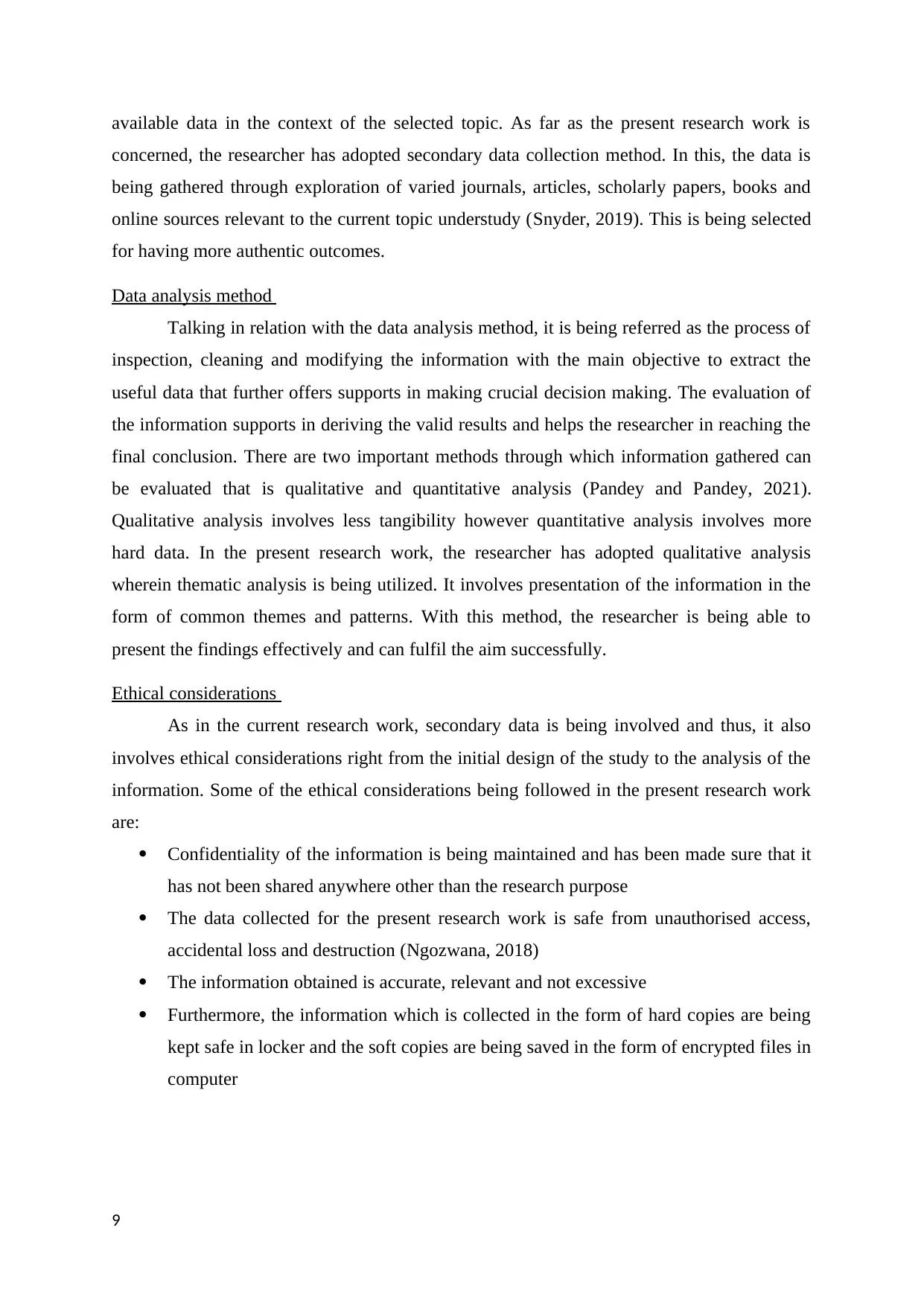
available data in the context of the selected topic. As far as the present research work is
concerned, the researcher has adopted secondary data collection method. In this, the data is
being gathered through exploration of varied journals, articles, scholarly papers, books and
online sources relevant to the current topic understudy (Snyder, 2019). This is being selected
for having more authentic outcomes.
Data analysis method
Talking in relation with the data analysis method, it is being referred as the process of
inspection, cleaning and modifying the information with the main objective to extract the
useful data that further offers supports in making crucial decision making. The evaluation of
the information supports in deriving the valid results and helps the researcher in reaching the
final conclusion. There are two important methods through which information gathered can
be evaluated that is qualitative and quantitative analysis (Pandey and Pandey, 2021).
Qualitative analysis involves less tangibility however quantitative analysis involves more
hard data. In the present research work, the researcher has adopted qualitative analysis
wherein thematic analysis is being utilized. It involves presentation of the information in the
form of common themes and patterns. With this method, the researcher is being able to
present the findings effectively and can fulfil the aim successfully.
Ethical considerations
As in the current research work, secondary data is being involved and thus, it also
involves ethical considerations right from the initial design of the study to the analysis of the
information. Some of the ethical considerations being followed in the present research work
are:
Confidentiality of the information is being maintained and has been made sure that it
has not been shared anywhere other than the research purpose
The data collected for the present research work is safe from unauthorised access,
accidental loss and destruction (Ngozwana, 2018)
The information obtained is accurate, relevant and not excessive
Furthermore, the information which is collected in the form of hard copies are being
kept safe in locker and the soft copies are being saved in the form of encrypted files in
computer
9
concerned, the researcher has adopted secondary data collection method. In this, the data is
being gathered through exploration of varied journals, articles, scholarly papers, books and
online sources relevant to the current topic understudy (Snyder, 2019). This is being selected
for having more authentic outcomes.
Data analysis method
Talking in relation with the data analysis method, it is being referred as the process of
inspection, cleaning and modifying the information with the main objective to extract the
useful data that further offers supports in making crucial decision making. The evaluation of
the information supports in deriving the valid results and helps the researcher in reaching the
final conclusion. There are two important methods through which information gathered can
be evaluated that is qualitative and quantitative analysis (Pandey and Pandey, 2021).
Qualitative analysis involves less tangibility however quantitative analysis involves more
hard data. In the present research work, the researcher has adopted qualitative analysis
wherein thematic analysis is being utilized. It involves presentation of the information in the
form of common themes and patterns. With this method, the researcher is being able to
present the findings effectively and can fulfil the aim successfully.
Ethical considerations
As in the current research work, secondary data is being involved and thus, it also
involves ethical considerations right from the initial design of the study to the analysis of the
information. Some of the ethical considerations being followed in the present research work
are:
Confidentiality of the information is being maintained and has been made sure that it
has not been shared anywhere other than the research purpose
The data collected for the present research work is safe from unauthorised access,
accidental loss and destruction (Ngozwana, 2018)
The information obtained is accurate, relevant and not excessive
Furthermore, the information which is collected in the form of hard copies are being
kept safe in locker and the soft copies are being saved in the form of encrypted files in
computer
9
⊘ This is a preview!⊘
Do you want full access?
Subscribe today to unlock all pages.

Trusted by 1+ million students worldwide
1 out of 23
Related Documents
Your All-in-One AI-Powered Toolkit for Academic Success.
+13062052269
info@desklib.com
Available 24*7 on WhatsApp / Email
![[object Object]](/_next/static/media/star-bottom.7253800d.svg)
Unlock your academic potential
Copyright © 2020–2025 A2Z Services. All Rights Reserved. Developed and managed by ZUCOL.




